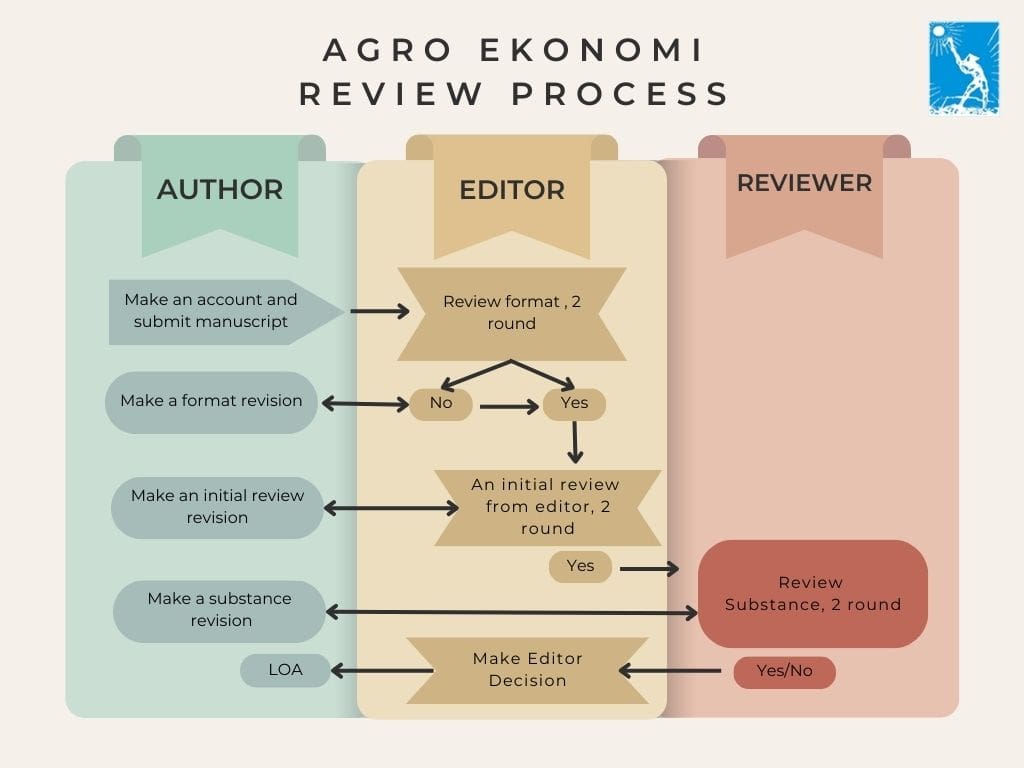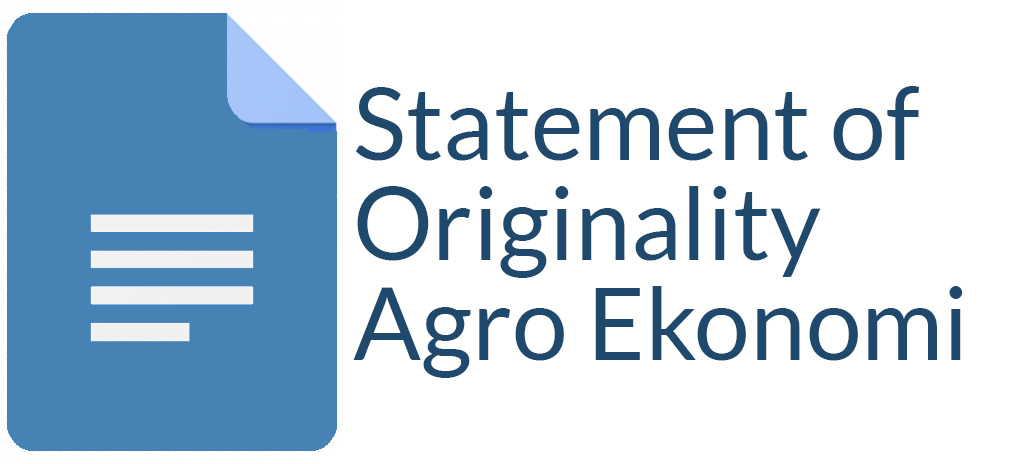Competitiveness Rice Farming In Sragen Regency
Cecep Suhardedi(1*), Dwidjono Hadi Darwanto(2), Irham Irham(3)
(1) Universitas Sarjanawiyata Taman Siswa
(2) Faculty of Agriculture, Universitas Gadjah Mada
(3) Faculty of Agriculture, Universitas Gadjah Mada
(*) Corresponding Author
Abstract
Rice is indonesian agriculture major crop. Indonesian rice historically has been the primary staple food and is an important economic driver and cultural symbol. On the basis of Sragen regency is one of the major rice producer in Central Java. This research aims to determine the level of private and social profi tability and competitiveness of rice farming in Sragen regency. Policy analysis matrix (PAM) is the approach used to determine the level of profitability and competitiveness of rice farming in Sragen Regency. Sampling conducted by Simple Random Sampling of the 20 districts in Sragen which are rice production area. The results show that the value of profi t for private and social is IDR 9.989.911,16 and IDR 4.273.004,18 respectively. Rice farming in Sragen Regency is profi table and feasible to cultivate. Two indicators to measure the competitiveness were Private Cost Ratio (PCR) which later shows that rice farming in Sragen Regency is more competitive as the PCR < 1, and Domestic Resources Cost Ratio (DRCR) shows that the rice farming has a comparative advantage as the DRCR < 1.
Keywords
Full Text:
PDFReferences
Akhtar, W., Muhammad, S. & Nadeem A. 2007. Analysis of Economic Efficiency and Competitiveness of the Rice Production Systems of Pakistan’s Punjab. The Lahore Journal of Economics. 12 (1). 141-153.
Antriyandarti, E., Susi W., & Minar F. 2012. Analisis Privat dan Sosial Usaha Tani Padi di Kabupaten Grobogan. Jurnal SEPA . 9 (1): 12 –18.
Andini, D., Edy, Y., & Dahlan, F. 2016. Peningkatan Daya Saing Ekspor Produk Olahan Kakao Indonesia di Pasar Internasional (Studi pada Ekspor Produk Olahan Kakao Indonesia tahun 2009-2014). Jurnal Administrasi Bisnis (JAB). 38(2). 171-174.
Aprilia, F., Zainul, A., & Sunarti. 2015. Posisi Daya Saing dan Spesialisai Perdagangan lada Indonesia dalam Menghadapi Globalisasi (Studi Pada Ekspor Lada Indonesia Tahun 2009-2013). Jurnal Administrasi Bisnis (JAB). 27(2). 1-7.
Badan Pusat Statistik. 2015. Jawa Tengah Dalam Angka 2014. BPS dan BAPPEDA Prov. Jawa Tengah. Semarang. 458 p.
............................... 2016. Sragen Dalam Angka 2015. BPS Kabupaten Sragen. Sragen. 319p.
Banerji, Ranadev., & Donges, Juergen B. 1974. The domestic resource cost concept: Theory and an empirical application to the case of Spain. Kiel Working Papers, No. 24. 1-38
Dreze, J., & Stren, N. 1990. Policy Reform, Shadow Prices, and Market Prices. Journal of Public Economics. (42) 145. 1-45.
Food and Agriculture Organization (FAO). 2015. Food Outlook. FAO. Rome (Italia). 142 p.
Giamalva, J. 2015. Rice: Global Competitiveness of the U.S. Industry. United States International Trade Commission Washington, DC. 442p.
Handoyo, M. J., Dwidjono H.D., Sugiyarto, & Setiyawan S.K.J. 2012. Kinerja Daya Saing Teh Indonesia di Pasar Internasional: Analisis Data Sekunder. Journal of World Trade Studies. 3(1) : 57-74.
Hanani, N. 2012. Strategi Pencapaian Ketahanan Pangan Keluarga. E-Journal Ekonomi Pertanian. (1) 1. 1-10.
Kanaka, S. & M. Chindurai. 2015. The Policy Analysis Matrix Of Rice Cultivation In India. European Journal of Basic and Applied Sciences. 2 (1): 33-45.
Khai, H.V., & Mitsuyasu, Y. 2013. The Comparative Advantage of Soybean Production in Vietnam: A Policy Analysis Matrix Approach. A Comprehensive Survey Of International Soybean Research Genetics, Physiology, Agronomy and Nitrogen Relationships. 7. 161-179.
Lukmanto, C.M.E., & Rullan, M. 2015. Konsep Agrikultur Sebagai Penyelesaian Dari Isu Pertanian. Jurnal Sains dan Seni ITS. (4) 2. 82-87.
Mantau, Z., Harianto., Nunung, N. 2014. Analysis of competitiveness of of low land rice farming in Indonesia, case study of Bolaang Mongondow District Nort Sulawesi Province. Journal Of Economics and International Finance 6(4) : 85-90.
McBrige, W.D. & James, D.H. 2006. Defining and Characterizing Approaches to Farm Management. Journal of Agricultural and Applied Economics.(38) 1. 155-167.
Mulyana, A. 2012. Penguatan Ketahanan Pangan Untuk Menekan Jumlah Penduduk Miskin dan Rentan Pangan di Tingkat Nasional dan Regional. Journal of World Trade Studies. 3(1) : 11-18.
Ningtyas, R.A., Ni Wayan, S.A,. & M. TH. Handayani. 2016. Tingkat Adopsi Sistem Tanam Jajar Legowo 2:1 Di Kelompok Tani Mina Sri Jaya Desa Sepanjang Kecamatan Glenmore Kabupaten Banyuwangi Jawa Timur. E-Jurnal Agribisnis dan Agrowisata. (5) 2. 362-369.
Pearson, S., C. Gotsch & S. Bahri. 2005. Aplikasi Policy Analysis Matrix pada Pertanian Indonesia. Terjemahan. Yayasan Obor Indonesia. Jakarta. 398 p.
Permatasari, D. L., & Vita R. 2016. Pemodelan Ketahanan Pangan di Indonesia dengan Pendekatan Regresi Probit Ordinal. Jurnal Sains Dan Seni ITS.(5) 2. 151-156.
Rahmasuciana, D.Y., Dwidjono, H. D., & Masyhuri. 2015. Pengaruh Pengadaan Beras dan Operasi Pasar Terhadap Harga Beras Dalam Negeri (Effect of Rice Procurement and Market Operations Toward Domestic Rice Price). Agro Ekonomi (26) 2. 129-138.
Setiawan, K., Slamet, H & Any, S. 2014. Analisis Daya Saing Komoditas Kelapa Di Kabupaten Kupang. Jurnal Agritech. 34(1): 88-93.
Soekartawi. 2006. Analisis Usahatani. Penerbit Universitas Indonesia. Jakarta. 110p.
Soekartawi., Soeharjo, A., John, L.D., & J.B. Hardaker. 2011. Ilmu Usahatani dan Penelitian untuk Pengembangan Petani Kecil. Penerbit Universitas Indonesia (UI press). Jakarta. 253 p.
Sugandi, Dede. 2014. A Model Of Environmental Conservation For Sagara Anakan. International Journal Of Conservation Science. 5 (1). 95-106.
Suryana, A. 2014. Toward Sustainable Indonesian Food Security 2025: Challenges and Its Responses (Menuju Ketahanan Pangan Indonesia Berkelanjutan 2025: Tantangan dan Penanganannya. Jurnal Forum Penelitian Agro Ekonomi. (32) 2. 123 – 135.
Zhong, F., Xu, Z. & Fu, L. 2010. Regional Comparative Advantage in China’s Main Grain Crops. ACIAR China Grain Market Policy Project Paper. 1:1-19.
Article Metrics
Refbacks
- There are currently no refbacks.
Copyright (c) 2017 Agro Ekonomi

This work is licensed under a Creative Commons Attribution-ShareAlike 4.0 International License.
View My Stats











